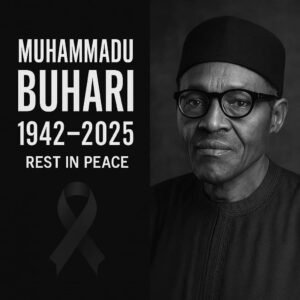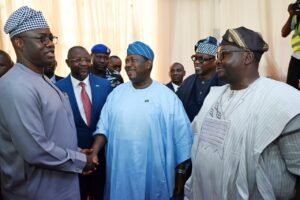🇳🇬 Farewell to a General: Muhammadu Buhari (1942–2025)

On Sunday, July 13, 2025, Nigeria received somber news: former President Muhammadu Buhari, aged 82, passed away in a London clinic. The confirmation came through a statement shared on his official X (formerly Twitter) handle by his longtime media aide, Garba Shehu, bringing an end to days of speculation about his health.
🕊 A Nation Mourns a Former Leader
Buhari’s passing marks the close of a significant chapter in Nigeria’s political and historical journey. As a former military ruler (1983–1985) and two-term civilian president (2015–2023), his life embodied both the turbulence and transition of Nigeria’s post-independence story.
From the soldier who seized power in a coup, to the democrat who won the people’s mandate decades later, Buhari was a symbol of Nigeria’s complex relationship with leadership, discipline, and democracy.
🪖 Soldier. Statesman. Symbol.
Born December 17, 1942, in Daura, Katsina State, Muhammadu Buhari joined the Nigerian Army in 1961 and quickly rose through the ranks. He was a battalion commander during the Nigerian Civil War and later served as Petroleum Minister under General Obasanjo.
His first shot at leadership came after the 1983 coup that ousted the Shagari-led civilian government. Known for his “War Against Indiscipline,” the Buhari military regime was austere, focused, and controversial. He was overthrown just 20 months later.
But history gave him another chance.
In 2015, after three unsuccessful attempts, Buhari was elected President in what was then hailed as Nigeria’s most peaceful democratic transfer of power. His promise was simple: to fight corruption, improve security, and rebuild the economy.
⚖️ A Legacy of Mixed Verdicts
Like most leaders, Buhari leaves behind a complex legacy. Supporters praised his anti-corruption efforts, infrastructure expansion, and bold agricultural initiatives. Critics point to growing insecurity, economic hardship, and perceived nepotism during his tenure.
Yet no matter the side of the aisle, one cannot ignore the historic weight of his presence—from the barracks to the ballot box.
He was a man both respected and criticized, feared and followed—a leader who never stopped believing that Nigeria could work, if only we were disciplined enough.
🕯 Reflections on Mortality and National Memory
As tributes pour in from across the globe, Nigerians are reminded once again of the brevity of life and the immortality of legacy. Whether one admired or opposed him, Muhammadu Buhari was undeniably a defining figure in modern Nigeria.
His passing invites us to reflect not just on his policies, but on the kind of nation we’re building—and the kind of leadership we yearn for.
🏛 What Happens Next?
The federal government is expected to announce official funeral arrangements and a period of national mourning. State honors, national tributes, and possibly an official burial in his hometown of Daura will follow.
But beyond the protocols lies a deeper, more personal mourning—for a generation of Nigerians who grew up knowing Buhari as a constant: sometimes on the screen, sometimes on the ballot, always in the headlines.
📝 Final Thoughts
History will debate Muhammadu Buhari for years to come. But today, we pause not to argue, but to acknowledge.
We say goodbye to a man who shaped Nigeria in more ways than one.
A soldier who lived for order.
A president who strived for control.
A Nigerian who walked the corridors of power for over five decades.
May his soul find peace. And may Nigeria, the country he loved—flawed, strong, and ever hopeful—find hers too.










This is the best write up ever. I knew you will always give the best on this event. RIP General Muhammadu Buhari. God loves you more than any Nigerian.
Temilade keep up the good work. I respect your consistency.
JohnPraise